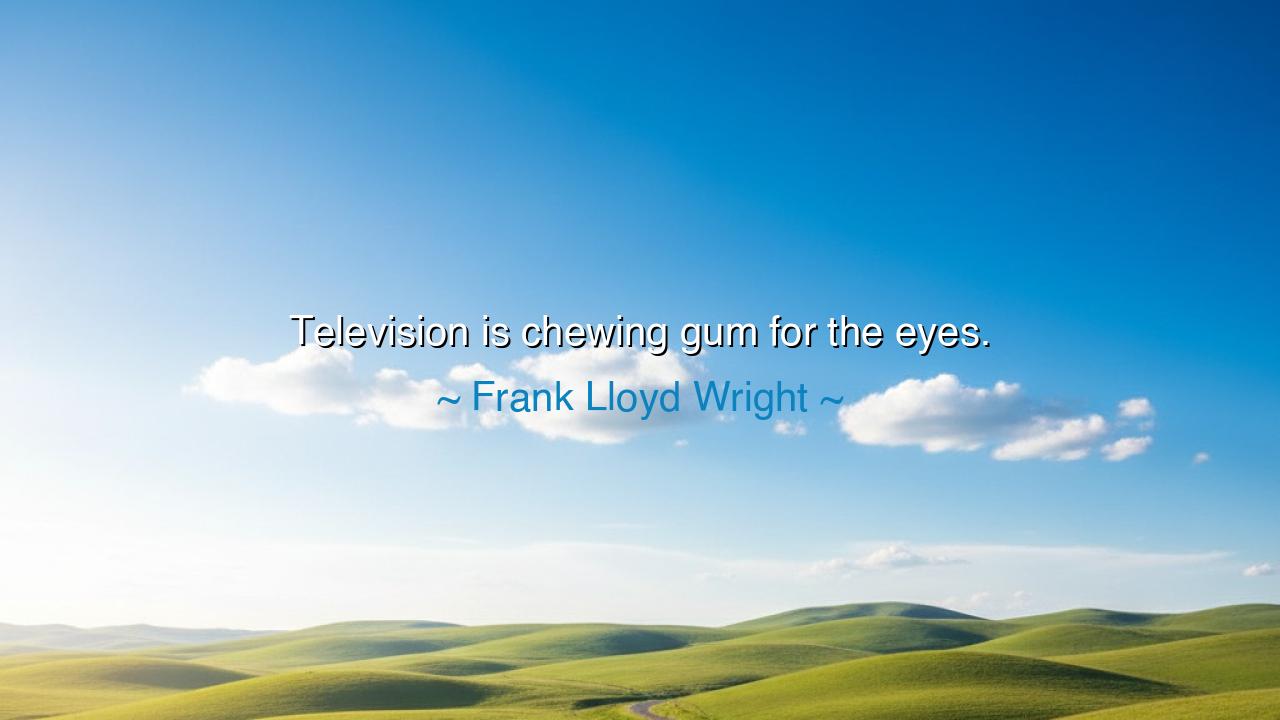
Television is chewing gum for the eyes.






"Television is chewing gum for the eyes." These sharp words from Frank Lloyd Wright offer a pointed critique of a medium that has become an ever-present part of modern life. With this metaphor, Wright draws our attention to the emptiness and shallowness that television can foster. Just as chewing gum offers a fleeting pleasure—one that is sweet at first but ultimately unsatisfying and disposable—television, in Wright’s eyes, offers momentary distractions for the eyes but does little to nourish the mind or soul. It is a fleeting indulgence that fills space without offering true substance.
In the ancient world, there was a recognition that the senses must be engaged with that which is noble, truthful, and meaningful. Plato, in his philosophical dialogues, spoke of the importance of engaging with ideas that elevate the soul, encouraging his students to look beyond the surface and engage deeply with the truth and wisdom of the world. In his Allegory of the Cave, he described people trapped in shadows, unable to see the full reality outside of their limited experience. In much the same way, Wright's metaphor suggests that television is a form of shallow entertainment, one that offers fleeting pleasures but does not lead to a deeper understanding of life or the truths that lie beneath the surface.
Consider the great philosophers and poets of the past—figures like Socrates, Aristotle, or Homer—whose works sought not only to entertain but to provoke deep reflection and intellectual engagement. The stories and ideas they shared were intended to stir the soul, to awaken us to the complexities of life, love, and existence. These thinkers were not concerned with providing immediate gratification or passing pleasure, but with creating works that would endure across the ages and shape the minds of generations. Television, in contrast, often offers momentary satisfaction but fails to provide lasting value or intellectual nourishment. The metaphor of chewing gum suggests that it is consumed quickly, its benefits fleeting, and its value largely insubstantial.
In more recent history, we see how the rise of mass media has shaped society. Television began as a revolutionary medium that promised to connect the world, inform the masses, and entertain. Yet, as it became more prevalent, many began to recognize the monotony and shallowness of the content it produced. Edward R. Murrow, a pioneering journalist, once lamented that the power of television had shifted from serving the public interest to serving commercial and superficial desires. Murrow’s warning echoes Wright's: television, once a tool for learning and connection, increasingly became a source of mindless consumption, akin to the chewing gum that numbs the senses rather than engaging them deeply.
Wright’s analogy also points to the danger of overconsumption of such fleeting entertainment. Like chewing gum, television offers a momentary escape, but this constant indulgence can leave one feeling spiritually empty and disconnected from the more meaningful pursuits of life. Just as excessive sugar or processed food can harm the body, so too can a steady diet of mindless entertainment harm the intellect and soul. The temporary pleasures of television may satisfy immediate cravings, but in the long run, they leave us feeling unfulfilled and hungry for more. This is the danger of consuming too much of what is easy and fleeting without engaging in that which challenges and enriches us.
Thus, the lesson in Wright’s words is clear: seek substance, not just pleasure. Life offers many opportunities to engage deeply with the world, to learn, to grow, and to reflect. Television, while not inherently bad, can become a distraction that pulls us away from these greater pursuits. The ancients knew that true growth came not from indulgence, but from discipline, thought, and reflection. To truly nourish the mind and soul, we must turn to those things that challenge us, that engage us in deep, reflective thought, rather than the shallow distractions that consume us in the moment.
So, let us take this wisdom into our own lives. Moderate your consumption of easy entertainment and seek those things that enrich your life. Spend your time on pursuits that engage your mind and soul—whether it be through reading, conversations, creative endeavors, or moments spent in nature. Television can be a tool for learning and connection when used consciously, but it is vital to remember that true fulfillment lies not in the quick pleasures of the screen, but in the lasting value of a life well-lived, full of deep understanding and purposeful action. Let us not be content with the fleeting satisfaction of chewing gum for the eyes, but instead seek the nourishment that comes from engagement with the deeper, richer aspects of life.






AAdministratorAdministrator
Welcome, honored guests. Please leave a comment, we will respond soon